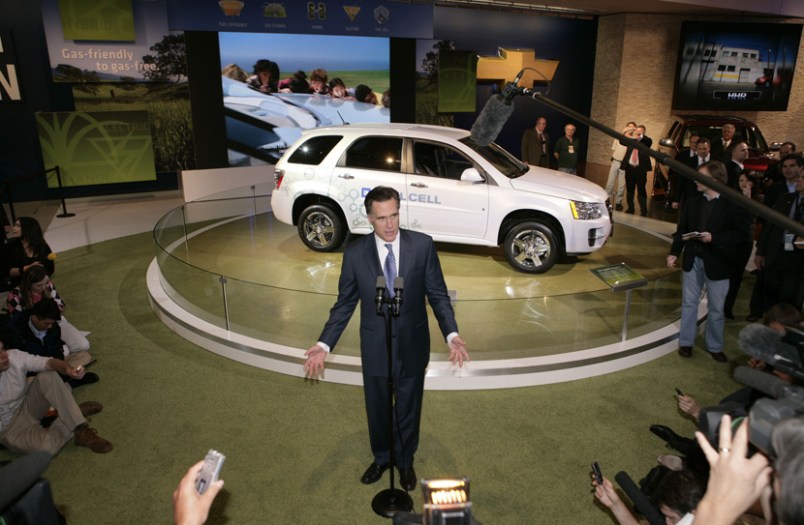With the general election in full swing, Mitt Romney is tacking to the center on the auto rescue with furious speed, with a top spokesman and then Romney himself both claiming he deserves a big “thank-you” for saving Detroit.
He doesn’t.
“I pushed the idea of a managed bankruptcy, and finally when that was done, and help was given, the companies got back on their feet,” Romney told a Cleveland TV station while visiting a local auto plant Monday. “So, I’ll take a lot of credit for the fact that this industry has come back.”
The trouble is that the people who helped craft the actual auto bailout — and not just on the Democratic side — have said Romney’s often confusing public position would likely have resulted in destruction of the industry.
“I’ve read, I think, everything Romney’s had to say on this subject, and the level of flip-flopping and dissembling is truly mind-boggling,” Steve Rattner, the “auto czar” who advised the White House on the auto rescue, told TPM. “He’s been on every side of the auto rescue at different times and said different things, so it’s hard to know what he honestly thinks.”
This isn’t the first time Romney has courted credit. He applauded Obama in 2009 for showing “backbone” in implementing certain aspects of the initial bailout, and called it “a course I recommended a number of months ago.” Romney’s position was vague enough then, despite a high-profile “Let Detroit Go Bankrupt” op-ed, to make a plausible case he and Obama were on the same page. But during the 2012 Republican primary he clarified that the measures he would have supported then were nowhere near what was needed to actually fix the problem at hand.
Both Romney and Obama agreed the car companies should be put through bankruptcy, which is what ultimately occurred. But the key difference was who would pay to keep the companies alive as they restructured. Experts say that without the tens of billions of dollars in federal loans, the companies would likely have been liquidated, as the private financial industry was in a meltdown of its own and completely unwilling to step in with loans.
Romney danced around this issue while campaigning in the Michigan primary earlier this year, where his bailout position received a lot of attention, but ultimately sided with those on the right who insisted the private sector should sort it out.
“The president tells us that without his intervention things in Detroit would be worse,” Romney wrote in an op-ed in the Detroit News in February. “I believe that without his intervention things there would be better.”
This squared with previous remarks during the primary: Romney told Piers Morgan in June 2011 that “the bailouts were a mistake” and suggested that the companies could have gone through bankruptcy immediately with minimal federal help.
Rattner told TPM that Romney’s initial opposition to President Bush’s emergency loans in his 2008 New York Times piece should have instantly disqualified him from claiming credit.
“The idea he deserves credit is preposterous since the op-ed he wrote in 2008 said ‘Let Detroit Go Bankrupt,’ meaning the government should stay out — and that would have been a disaster,” he said. “I just think he’s somewhere out in the ionosphere.”
Romney’s insistence in February that he would have saved Detroit — even as he assured conservatives he opposed Obama’s rescue — drew some pushback from within his own party. Even while campaigning in support of Romney in Michigan, Rep. Fred Upton (R-MI) told reporters plainly, “There was no one that could have picked up those pieces other than the federal government.”
Rattner penned a New York Times op-ed at the time savaging Romney for claiming credit for the most popular aspects of the bailout while disowning the loans that were necessary to make it work, an approach he said was a “fantasy.” He publicly challenged Romney to name a single private investor who’d say they were willing to finance the auto industry at the time.
Democrats rushed to hold Romney to his original position after his latest comments Monday. The Obama campaign distributed a statement from Rep. Sander Levin (D-MI), one of the strongest advocates for the auto rescue in 2009.
“Mitt Romney is on a hook of his own making because of his vocal opposition to the auto rescue, which saved General Motors and Chrysler from liquidation and prevented hundreds of thousands of job losses in a vital industry,” Levin said. “Governor Romney should have the courage and integrity to say he was wrong instead of trying to pull off another flip-flop.”
United Auto Workers president Bob King also sent a statement to TPM decrying Romney’s claims.
“Romney has been vocally opposed to the auto loans for the past 3 years,” King said. “He criticized President Obama as recently as February, 2012 in his opinion article in the Detroit News saying, ;The president tells us that without his intervention things in Detroit would be worse. I believe that without his intervention things there would be better.’ But now he’s claiming credit for President Obama’s intervention to save the industry.”
Romney will likely be asked to clarify his position further Tuesday as he returns to Michigan, the state most affected by the auto rescue. But at this point, he’s taken so many twists and turns, it’s impossible to have any clear idea what exactly he would have done.









